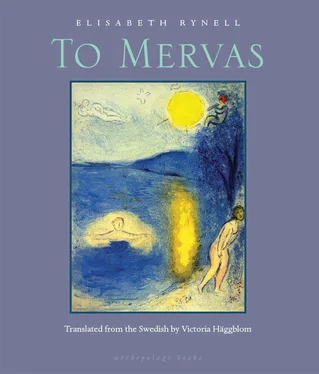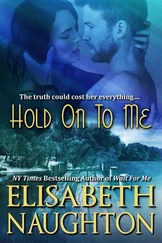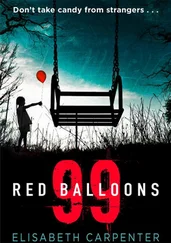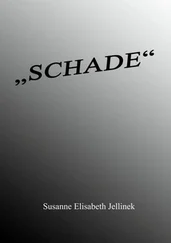Now it was really evening, and I felt I had to get out, had to leave my apartment, get away from everything that had settled in its walls, the sour breathing of years that felt as if it would suffocate me. I took a comb from the bathroom cabinet and pulled it lovelessly through my shoulder-length, nowadays thin gray hair. After that, I painted my lips red and dabbed some powder on my large-pored skin, swollen from crying. Have to get out of the apartment, I thought, perhaps down to the store to buy some food, anything.
It was after suppertime. November. The air had gotten cold and spots on the ground that used to be wet had turned into ice. There was a faint wind and I walked around the block. Three-story buildings were arranged around the yards like loaves of bread, and there were a few single-family houses on display. These were residential neighborhoods, the streets seemed bored; the whole area caught in a suppressed yawn. I walked on listlessly, and suddenly stood outside the front door of my building again. I had nowhere to go and the mere thought of the grocery store made me anxious, it was too bright in there for me tonight, I didn’t want to walk around with a basket on my arm and have to pick and choose; it seemed impossible, disgusting. So without actually making any kind of decision, I walked over to a small neighborhood restaurant that had recently opened, a place I’d never been before and never even considered going, because I don’t go to restaurants. I walked in and sat down at a table. I had the remarkable feeling that everything was an illusion, a liberating sensation of not being myself but someone else, perhaps someone in a movie, someone outside myself I could watch and perhaps pretend to be for a little while. I ordered food and a small carafe of red wine and a little later another glass of red wine and a pack of cigarettes. Except, it wasn’t really me, it was the woman in the movie who did all this. She was a tired middle-aged woman, just like me, but far more interesting and confident. She was now getting a little drunk sitting in the small, cozy space, its red dimness reflecting her life back to her like a crystal ball. She saw all the images and allowed them to emerge without resisting. She sat there gazing into the beautiful red wine in her glass while the thoughts and images in her mind drifted freely: it was as if she saw her life inside that glass and she leaned over it in order to take a close, careful look.
A letter has come, I thought, and a sudden fearlessness filled me: I wanted somehow to feel how time had passed, all those years after Kosti, how my life turned out, how everything turned out. I dared thinking about the fact that I had been a mother: even someone like me had become a mother by giving birth to a child, a boy, my deformed boy, unfit for life. And now I saw the years, months, hours, and minutes bound to him, the peculiar slowness, millimeter upon millimeter of the gray, faintly buzzing slowness I’d felt together with him. It was like a period of timelessness injected into my life, and when I looked into the glass, I saw those years, saw them moving faintly down there on the bottom. I’d been absorbed by timelessness back then; I’d let myself be nourished by it. I’d been a mother during those years after Kosti, a mother to a helpless child, and even though this child was no longer alive, I dared to think I’d gone on being his mother, and that I’d kept living with him in that timelessness. Perhaps that’s why I’d been hit so hard by Kosti’s letter; he’d jolted me into the present. And that hurt. Timelessness is a kind of death that attracts those who cannot or do not have the courage to live. But despite my pain, I also noticed that something had awakened in me during the day and it was calling me, there was something intriguing about the memories and images that flashed through me as I drank. It was as if I’d been missing myself for a very long time. As if I’d been standing abandoned for a very long time.
The boy’s face. Heavy and impossible to read. The mouth without control and constantly glistening wet, a mere cavity that had happened to end up in his face. He couldn’t reach his own mouth, couldn’t access it fully. It was as if a thread, the link that connected him to his own body, had been severed. His legs and hands were also half-asleep, somehow muddled. He couldn’t reach himself anywhere.
Except his eyes. He existed through his eyes. His gaze reached out from that big, lifeless body, found its way past an otherwise meaninglessly constructed face. From the moment he was born, his gaze had been the same. And it seized me. From the very beginning, there was an intimacy between us so profound that as soon as I recognized it, I knew I’d never be able to escape it. His gaze went straight into my life.
I remember the first few days after his birth as a quake. A quake that reached all the way to the center of the earth. I had just delivered, felt so recently opened. At the same time, I burned with a sense of presence. They left me alone with him for twenty-four hours. Then they came and tore us apart. They stole my boy.
It was at the radiology ward, you know, where there are lots of odd little booths with drapes covering the open doors. I sat in one of those booths and waited for them to return with my boy. The booths around me were empty: the whole place seemed deserted. Perhaps it was the weekend. During the night, my breasts had filled with something that felt like cement. They were enormous. Rock hard. So tender that even the light feeling of my clothes against my skin made me shiver with pain. I thought I was the one who had just been born. I was as newly born as my small child that they’d just carried away. And in this strange new world, nothing existed but him, nothing but the child, only his gaze, his smell, and the feeling of his small, eager mouth searching for my nipples.
I remember that it took a while. Then I heard steps, and voices far away in the maze of booths. I sat, alert, and listened. A man’s voice called out:
“I’ve found a space in ward nineteen!”
I’d already left the booth and ran like a blind person through the maze. Suddenly, I saw the doctor standing there, the one who’d called out, and I threw myself at him.
“Where’s my boy?” I screamed, my fists hitting his chest. “Where have you taken my child?”
“Calm down!” the doctor yelled, and grabbed my wrists. “Calm down a little, and I’ll explain.”
But I wasn’t calm. I tried to drag him in the direction where I thought they’d taken my boy.
“Give me back my child right now!” I screamed. “I want my child, I want my child, I want — ”
I burst into tears, and the doctor I had attacked a moment earlier put his arm around me and led me into a booth.
“Try and pull yourself together. I’m going to explain what’s going on,” he said formally and rather sternly. He took a pencil from the breast pocket of his shirt, and I hated him. Go on, talk, I thought. I know you’re lying. I know you’ve taken away my son to slaughter him. My hatred was so intense it ought to have made him dissolve like a fly in an acid bath.
“You’re going to slaughter my son,” I said.
“No, we’re not. We’re going to try to help him. Your son is gravely ill and I insist that you make an effort to listen to me.”
He drew something on the paper that covered the examination table inside the booth and explained how something was very wrong inside the boy’s head. I didn’t believe what he was saying, and listened with only half an ear since I was sure they’d taken the boy to slaughter him. I knew I was the only thing my boy needed, and it was up to me to save him.
“I want to go to ward nineteen, where my child is,” I said as soon as the doctor had finished talking.
Читать дальше












